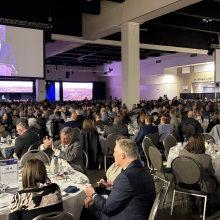Minnesota’s economy and the future of global trade

By Doug Loon
President and CEO
Minnesota Chamber of Commerce
Dear Minnesota business leaders,
Trade is a fundamental driver of Minnesota’s economy. Our state has a long history of developing innovative products and bringing them to markets around the world. In 2024, Minnesota’s exports topped $30 billion — accounting for more than 6% of the state’s GDP and supporting an estimated 750,000 jobs. Minnesota companies also depend on access to global supply chains, particularly for critical inputs that aren’t easily grown, extracted or produced domestically.
As Minnesota navigates a changing global economy, we need to do two things at once:
- First, celebrate and seek to advance fair trade strategies that strengthen our global relationships — especially with North American partners — which are essential to the state’s economic performance.
- Second, position Minnesota to compete in a new era of heightened domestic investment in manufacturing, energy and natural resources.
Strengthening fair trade
Recent tariff actions have brought trade issues into sharper focus, raising questions about how best to promote a level playing field for U.S. producers and manufacturers, strengthen supply chains and ensure expansion of investments in production, technology and manufacturing.
Targeted tariffs – aimed at specific products or bad actors – can prevent unfair trade practices. The U.S. has experienced foreign governments using the power of their treasury to gain unfair economic advantage through state subsidy of their production, lower environmental and safety standards, and manipulation of their currency. This results in dumping state-subsidized goods into the U.S. market at artificially low prices. Steel producers in the U.S., for instance, have faced such challenges for years, particularly from China, warranting action to restore fair competition while seeking to protect domestic prices. In such cases, targeted tariffs and strong enforcement of existing U.S. trade laws can protect U.S. companies.
Broad-based tariffs, however, applied across entire sectors or regions can carry unintended economic consequences. Modern supply chains are deeply interconnected — especially within trade zones like North America, where goods frequently cross borders multiple times before becoming finished products. Minnesota companies rely on these supply chains to build innovative products here and sell them in the global marketplace. For example, over 90 percent of oats milled for food in the United States are grown in Canada and then manufactured in the United States to be converted into billions of servings of food. Broad-based tariffs risk triggering artificially increased prices, disrupted supply chains, and retaliatory tariffs. These effects can impact a wide range of Minnesota businesses, from retailers selling goods locally to manufacturers and agriculture producers who export products worldwide.
In our view, the U.S. should look now to strengthen free and fair trade agreements and pursue additional comprehensive trade pacts with zero-for-zero reciprocity on tariffs. Such trade agreements more effectively create market access for U.S. companies and ensure a free, fair and level playing field. The shift from NAFTA to the USMCA illustrates the benefits of this approach. In 2016, Minnesota imported more from China than from Canada and Mexico combined. By 2023, nearly half of imports came from North America—and just 10% from China. Minnesota’s exports to Canada and Mexico rose sharply, while exports to China, Germany, and Japan declined.
Position Minnesota for investments and reshoring
Underlying the debate around tariffs is a growing consensus that America should invest more heavily in domestic manufacturing, energy, technology and natural resources. There has already been a surge of investments in industrial sectors this decade, with new facilities and expansions flowing to states with efficient permitting systems, strong talent pipelines and pro-growth policies.
Regardless of actions in Washington, Minnesota should take steps at home to position itself to compete in this changing landscape.
As outlined in our Chamber Foundation’s report, Minnesota: 2030, Minnesota has many strengths, but we’ve lagged behind peers in landing large-scale investments. Barriers like long permitting timelines, costly mandates, and a burdensome tax and regulatory environment limit our competitiveness. Minnesota must address these barriers to capture future investments.
The Minnesota Chamber Foundation and our Grow Minnesota! program have produced a series of reports that provide a roadmap for policymakers to consider. The time is now to make strategic reforms and adopt policies that enable the private sector to choose Minnesota when they consider where they’ll place their next investment. For example, the Minnesota Chamber Foundation’s recent research on environmental permitting identifies actionable strategies to reduce permitting timelines and increase certainty when a business seeks to expand or build a new facility.
Given the right tools and a fair playing field, Minnesota businesses can compete and lead in the global economy.
What we are doing today to prepare for tomorrow
Highlight the importance of trade: First, we are creating awareness of the importance of trade with our current trading partners. This is particularly important with our North America neighbors. We should also seek to remedy the shortcomings in our trade relationships. Canada, our most important trade partner, is a case in point: We should work to ensure that our neighbors comply with USMCA commitments on dairy products, an area where U.S. exporters face trade barriers.
Advance policies that promote fair trade: The U.S. should address trade issues with an eye on balanced trade, seek to enforce existing commitments in trade agreements rather than issuing broad-based tariffs, and enhance federal enforcement of existing rules to protect U.S. companies against blatant trade violations and unfair practices.
Promote local supply chains: We are retooling our Grow Minnesota! program and its Supplier Match services to enable companies with vulnerable supply chains to look closer to home – right here in Minnesota – to secure their supply chains.
Lead efforts to make Minnesota more competitive: We are working right now at the Minnesota Legislature to promote reforms that can improve our economic position. With action underway, the Legislature is considering proposals to improve our state’s environmental permitting process. We are promoting meaningful reforms to new employer workforce mandates. We are advocating no new taxes as the state wrestles with a new budget and proposing tax reforms to help reduce the barriers to new investments in our private sector.
Address workforce shortages: To help ensure Minnesota is ready to compete, we will need to grow our workforce. The Chamber has several programs designed to leverage and expand our workforce through tools to find, attract and retain workers. We will advocate for federal legal immigration reforms and strategies to build inclusive workforces among populations overlooked.
Annual Washington, D.C. Fly-in: We are planning a robust trip to our nation’s capital to meet with elected officials to promote our shared agenda of promoting Minnesota’s interests. Trade policies, tax reforms and immigration policy will be on the agenda.
While uncertainty looms with global trade, we must work now to create greater certainty for Minnesota businesses. We stand for policies to ensure a business environment that values our entrepreneurs, our headquarters economy, and every company in between. Now is the time to work together to make Minnesota the best place for workers and families and for business development to ensure our economic future.



